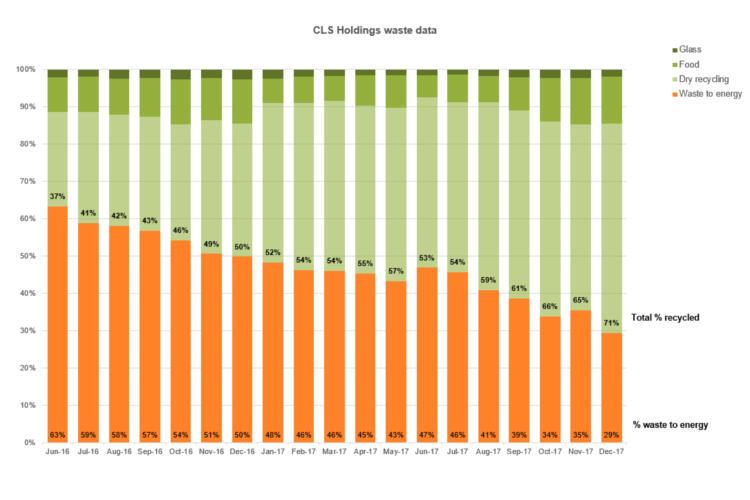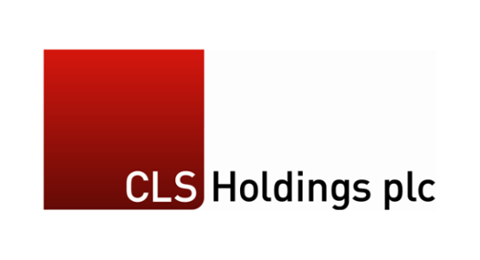CLS Holdings Nearly Doubles Recycling Rates
04 May 2018CLS Holdings Nearly Doubles Recycling Rates
04 May 2018CLS Holdings has nearly doubled recycling rates through a recycling campaign across multi-let offices, retail and leisure space and student accommodation. An increase in the ratio of recycling bins to general waste bins has been critical to the success of the campaign, along with occupier engagement and food waste recycling.
Key Facts
- 71% RECYCLING, UP FROM AROUND 37%
- 901 TONNES RECYCLED SINCE JUNE 2016
- £8,700 ANNUAL COST SAVINGS FOR OCCUPIERS
- IMPROVED DATA ACCURACY
Situation
CLS Holdings is a commercial property investment company. As part of its ongoing sustainability commitment, the company set a target in 2016 for the UK managed like-for-like portfolio to recycle above 70% of all waste collected and divert 100% from landfill. At the time, each building tendered waste management services individually, using different providers, all with their own reporting styles.
Actions
Stage 1 - Group tender: CLS Holdings set about grouping the waste management services into a single tender, led by the Group Sustainability Manager. This comprised 20 properties, including offices, leisure and student accommodation. Key decision-making criteria included service levels, improved data reporting, access to a materials recycling facility (MRF) and anaerobic digestion, and value for money. Bywaters was appointed in May 2016.
Stage 2 - FM engagement: CLS Holdings’ Group Sustainability Manager then engaged with Facilities Management (FM) teams in each building, sharing knowledge and providing support through one-on-one sessions and team meetings. Waste targets were added to the building objectives for FM teams to work towards. Monthly building league tables of performance were also introduced, generating healthy competition.
Stage 3 - Bin ratios: Bywaters and FM teams worked together to improve recycling infrastructure in back-of-house areas, improving the ratio of recycling to general waste bins. This is critical to changing behaviour. If general waste provision is larger than recycling provision, it is very difficult to change behaviour. Ratios in many buildings switched from around 33% of capacity for recycling to 75% and above.
Stage 4 - Occupier engagement: FM teams actively engaged with occupiers on waste management, particularly focusing on properties that had large waste generation. They met with occupiers to understand what bins they had on their floors and what their bin ratios were, ensuring they matched the provision in back-of-house areas. They also introduced coloured bags that matched bin colours, so cleaners intuitively knew which bins to use.
Stage 5 - Food waste: As the bin ratios were addressed and the recycling campaign gained momentum in each building, the Group Sustainability manager and FM teams then looked to introduce food waste recycling, in addition to glass and dry recyclables. Large 120 litre food waste bins were put in back-of-house areas in each building and CLS Holdings purchased 10 litre caddies for all kitchenettes within occupier areas across the portfolio. The food waste is collected and managed by Bio Collectors, which transports all the food to its anaerobic digestion facility, producing power for Bromley, an area where CLS Holdings owns three properties.
Financials
- £16,600 investment in new bins purchased by CLS Holdings.
- £8,700 estimated annual cost savings for occupiers, with 39% lower costs for dry recycling bins than general waste bins.
Benefits
- Achieving CLS Holdings’ two waste targets, demonstrating to occupiers and investors that its UK portfolio is responsibly managed:
- Zero waste direct to landfill since June 2016.
- 71% recycling in December 2017, a dramatic increase from 37% in 2016. This is based on data provided by Bywaters, mainly from weigh on trucks, with some shared loads.
- 901 tonnes of waste recycled since 2016, including glass, food waste and dry recyclables (see graph below).
- Supporting occupiers’ sustainability goals.
Challenges and Achievements
REPORTING
How to improve waste data accuracy?
There are three main types of waste collection trucks, each with different pros and cons, including accuracy levels:
- Weigh on, where everything is weighed as it goes onto the truck, whether by bag or bin. These are highly accurate but require more technology on board and so tend to have less capacity and take longer to make collections than standard loading vehicles. They are more common in central London and other major cities.
- Standard loading, where waste is compressed in the truck, often collected across multiple sites, weighed at the MRF and then data is apportioned across the sites.
- Caged trucks, which traditionally take bags, where weight is estimated based on an average weight per bag, e.g. 5 kilos, regardless of how full it is or what is in it.
CLS Holdings switched to weigh on trucks where appropriate. In 2016, around 95% of CLS Holdings’ waste data was based on assumptions. This was reduced to around 61% in 2017. The Managing Agents Partnership is working to improve waste management reporting.
OCCUPIER ENGAGEMENT
How to bring occupiers on board?
Early on, FM teams identified ten occupiers that they thought might be resistant to changes in waste management, based on previous conversations. The Group Sustainability Manager engaged directly with these occupiers to bring them on board, sharing the sustainability benefits of the new approach and the potential cost savings. FM teams engaged with other occupiers. This engagement resulted in CLS Holdings agreeing to fund bins and bags in both occupier demises and back-of-house areas for existing and new occupiers. This means that there are consistent bin ratios in all areas and logical colour sequences: orange for dry recycling, clear for food waste and blue for general waste. This system is intuitive for all cleaning teams, so that their default is to recycle. Waste has also naturally moved onto the agenda for all occupier meetings and several occupiers ask FM teams for waste data, which is easily available.
*Please note that the information on this page was supplied by the BBP Member and the BBP assumes no responsibility or liability for any errors or omissions in the content



